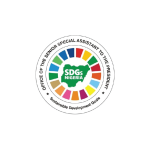
Get to Know Us
We at CirculatE recognize that Africa is a global emerging market, therefore, to build a sustainable continent, we need to help improve information about our economic prosperity, environmental protection, and safety nets for Africans. More importantly, we need to focus on building the capacity to compete effectively and meet global standards.
In promoting sustainable development in Africa, the economic, social, and environmental implications of all development planning and delivery of projects must be captured at the initiation process to achieve a completely ‘Clean Development.’
African nations are not left out in the worrisome global climate change. Though statistically, Africa has the lowest greenhouse gas emission, the economic activities are largely dependent on carbonated inputs. Activities such as transportation, industries, power supply, agriculture, and rural residential activities all require natural gas consumption or the burning of fossil fuels. We acknowledge that these economic activities have a huge negative effect on the environment and on the people who are the initial target and intended beneficiaries of all the development activities.
We also recognize that there is a need for positive change from this worrisome scenario; a low and eventually no-carbon development by mobilizing stakeholders to take a longer-term view and consider the future implications of economic and social actions so as not to affect the opportunities of current and future generation. This positive change is what we promote at CirculatE: transforming humanity’s planetary impact from predominantly degenerative to by and large regenerative.
On a Journey to
Absolute Decarbornisation
We at CirculatE recognize that Africa is a global emerging market, therefore, to build a sustainable continent, we need to help improve information about our economic prosperity, environmental protection, and safety nets for Africans. More importantly, we need to focus on building the capacity to compete effectively and meet global standards.
In promoting sustainable development in Africa, the economic, social, and environmental implications of all development planning and delivery of projects must be captured at the initiation process to achieve a completely ‘Clean Development.’
African nations are not left out in the worrisome global climate change. Though statistically, Africa has the lowest greenhouse gas emission, the economic activities are largely dependent on carbonated inputs. Activities such as transportation, industries, power supply, agriculture, and rural residential activities all require natural gas consumption or the burning of fossil fuels. We acknowledge that these economic activities have a huge negative effect on the environment and on the people who are the initial target and intended beneficiaries of all the development activities.
We also recognize that there is a need for positive change from this worrisome scenario; a low and eventually no-carbon development by mobilizing stakeholders to take a longer-term view and consider the future implications of economic and social actions so as not to affect the opportunities of current and future generation. This positive change is what we promote at CirculatE: transforming humanity’s planetary impact from predominantly degenerative to by and large regenerative.





